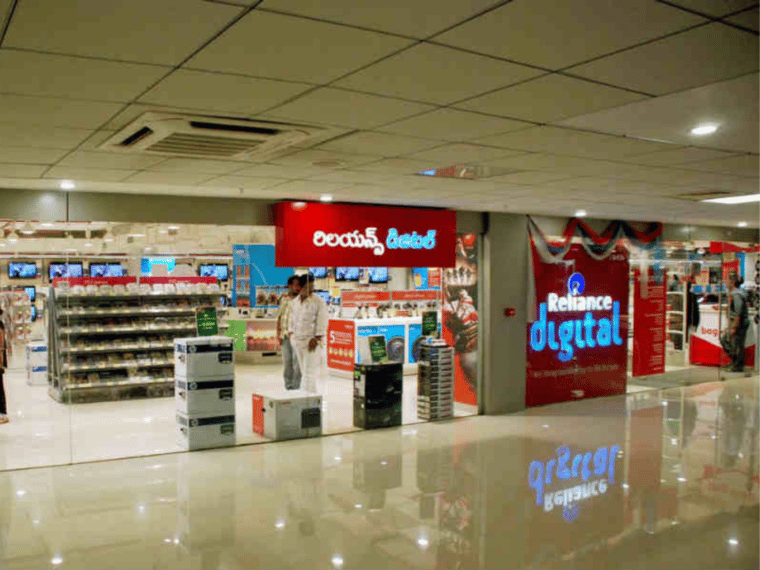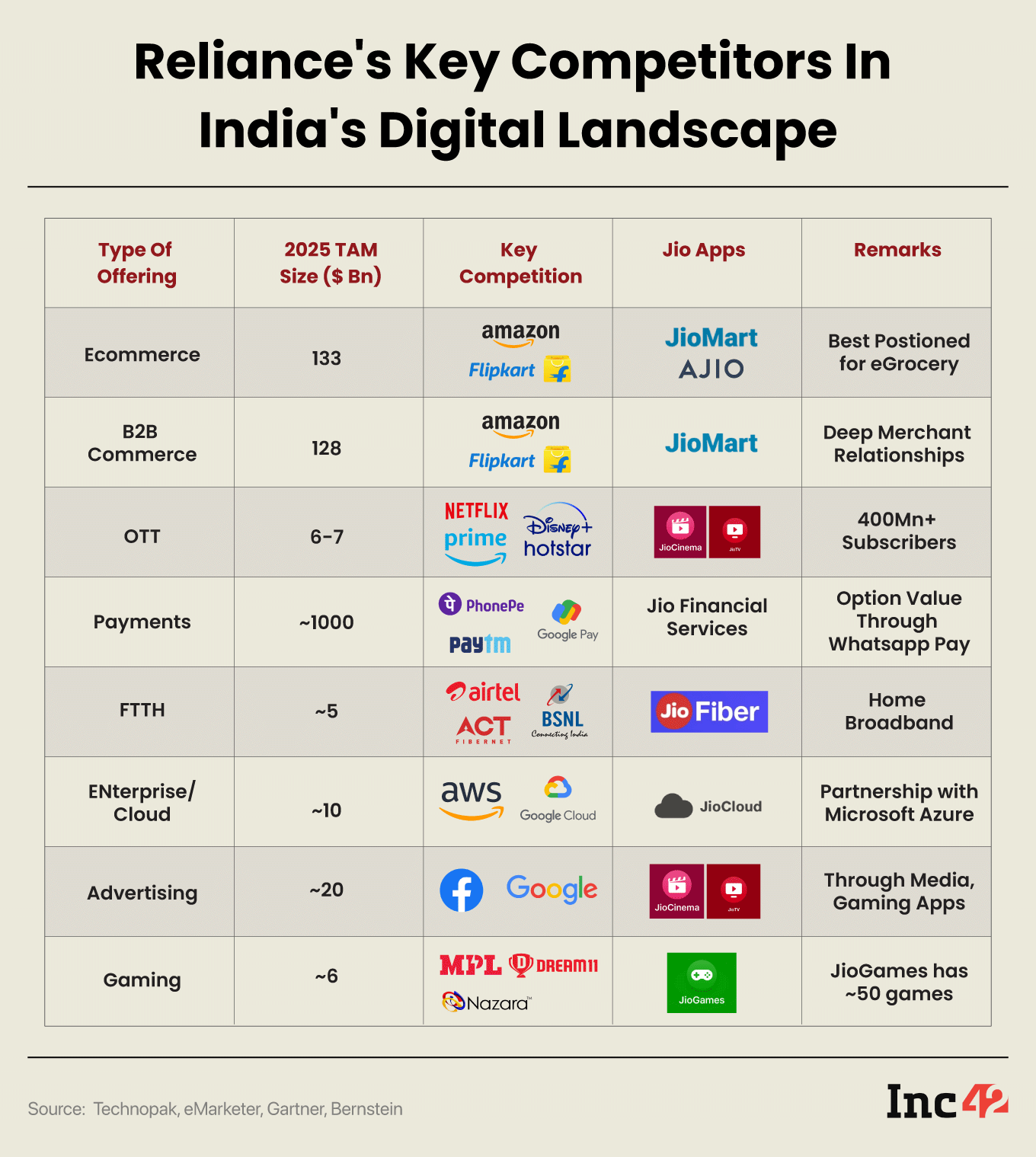
India is evolving into a three-player market with Amazon, Walmart, and Reliance being the leaders and Reliance is the best-positioned player in the country’s ecommerce market: Bernstein
Bernstein analysts opine that Mukesh Ambani's conglomerate Reliance has that disruptive playbook that throws strong competition to Amazon and Walmart
The brokerage believes that the deep content distribution of Jio apps is a key strength for the company in the digital economy and a core component of India's digital ecosystem
Even as India’s ecommerce market continues to witness a significant influx of several new-age players and D2C brands, Reliance Retail is still the best-positioned player in this market that’s growing by leaps and bounds, believes brokerage Bernstein.
“The advantages of its retail network, mobile network, digital ecosystem and ‘home field advantage’ in a famously complex regulatory and operating environment mean in the long term, it will likely claim the lion’s share of the $150 Bn+ ecommerce marketplace,” said the brokerage.
Bernstein analysts opine that India is evolving into a three-player market with Amazon, Walmart, and Reliance being the leaders. While the conventional retail business model starts out either offline, like what Walmart has done, or online, like the game that Amazon has cracked, India needs an integrated model of offline and online ecommerce brands and prime services like entertainment, OTT, and gaming, along with strong distribution capability and superior cost advantage against online players.
The analysts opine that Mukesh Ambani’s conglomerate Reliance has a disruptive playbook that throws strong competition to Amazon and Walmart.
It must be noted that Reliance Retail posted a 30% year-on-year (YoY) jump in its net profit to INR 9,181 Cr in FY23, and a 32% surge in operating revenue to INR 2.30 Lakh Cr in the year.
Last year, Reliance beat Amazon to acquire BigBazaar’s stores in the country after a long legal battle. In November last year, Reliance Industries also won over Amazon and Indian startups, including Swiggy and Udaan, to acquire German wholesaler Metro’s Indian business.
Reliance Retail has been actively expanding its portfolio through acquisitions. Recently, the company acquired a footwear retailer, V Retail, and a makeup and personal care brand, Insight Cosmetics. It also picked a majority stake in leading couturiers Abu Jani and Sandeep Khosla last year.
Reliance’s Disruptive Playbook
Reliance Industries Limited has also been growing overall. Its net profit increased 18.3% YoY to INR 21,327 Cr FY23 with gross revenue of INR 2.39 Lakh Cr.
Just like the retail business, its entertainment business also continues to grow. It acquired the exclusive rights to stream the IPL matches for five years until 2027. As per a recent report, Reliance Jio also plans to release 100 movies and shows on its OTT platform, JioCinema, over the next 18-24 months.
“The winner in the Indian ecommerce market will be the one with the most compelling integrated value proposition, offline + online + prime. Reliance Jio has the most disruptive playbook, using an integrated approach to consumers – $18 Bn GMV (Reliance retail), 355 Mn consumers (Reliance Jio), and compelling prime apps (JioTV, MyJio, JioSaavn, and Jio Prime),” Bernstein noted in its report.
On the regulatory front, the brokerage had earlier noted how Reliance Retail/JioMart could leverage a first-party (1P) model in its ecommerce business to drive scale while Indian regulations prevent foreign entities like Amazon to use the model, which has to rely on a third-party (3P) model in the country.
Meanwhile, Reliance Retail is also growing its footprint in the online beauty and personal care (BPC) segment with the launch of Tira, which has increased the market competition for new-age BPC players like Nykaa.
Reliance’s AJIO also holds a significant market share in the fashion and lifestyle ecommerce segment, making it even more difficult for startups like Nykaa to establish a foothold in the market. It is pertinent to note that since launching Nykaa fashion in 2018, the vertical is facing major challenges in scaling and witnessing degrowth with skyrocketing customer acquisition and marketing costs.
Meanwhile, Bernstein also noted that Reliance Retail JioMart Kirana is aggressively using both traditional and eB2B models to capture ‘kirana’ (grocery) stores, given that India has a large market opportunity in this segment.
The brokerage believes that the deep content distribution of Jio apps is a key strength for the company in the digital economy and a core component of India’s digital ecosystem.
While the conglomerate competes with Flipkart and Amazon in the ecommerce segment, it counts Facebook and Google as its biggest competitors in the advertising space. On the other hand, in the OTT segment, Netflix, Amazon Prime, and Hotstar continue to remain the biggest competitor of Reliance’s offerings like JioTV and JioCinema. In the gaming segment, Bernstein views Dream 11, Nazara, and MPL as the biggest competitors to Reliance’s JioGmaes.

Despite competition across digital segments, Bernstein expects Reliance Jio to become the core platform for India’s digital economy, which it projects to have a total addressable market (TAM) of $1 Tn by 2025.




 Fintech
Fintech Travel Tech
Travel Tech Electric Vehicle
Electric Vehicle Health Tech
Health Tech Edtech
Edtech IT
IT Logistics
Logistics Retail
Retail Ecommerce
Ecommerce Startup Ecosystem
Startup Ecosystem Enterprise Tech
Enterprise Tech Clean Tech
Clean Tech Consumer Internet
Consumer Internet Agritech
Agritech




























